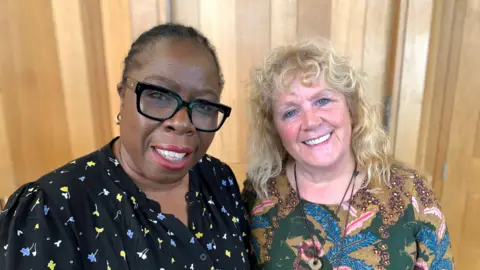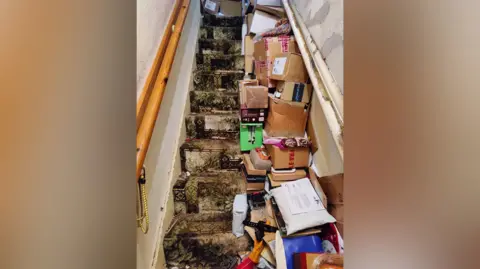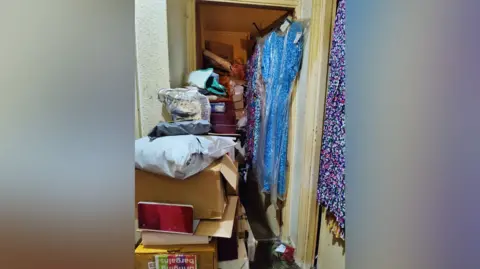MP calls for action on hoarding disorder
 BBC
BBCHoarding disorder has become "a national emergency in America", an MP has said, "so we need to look at it here."
Paulette Hamilton, Labour MP for Birmingham Erdington, spent years as a district nurse before entering politics.
On her care rounds she would sometimes encounter patients living in hoarded homes, where their mental health had deteriorated to such an extent that they were surrounding themselves in personal possessions.
"You can't just go in and clear a house and that's what people need to understand," Hamilton said.
"As a society we have a responsibility to support them, and Heather has shown us the way".
The MP is referring to Heather Matuozzo, founder of Birmingham-based social enterprise Clouds End CIC, whose work in communities the BBC has been following for four months.
As well as offering hoarding training to professionals nationally, her group has supported more than 300 people in Birmingham who hoard or are at risk of hoarding.
It offers people help to declutter their homes while also ensuring they have access to the appropriate mental health support.

In a recent meeting in Westminster, Ms Matuozzo informed the MP that the numbers needing support in the city – and those being referred for help - had risen exponentially since the Covid pandemic, something which was likely to have been reflected across the country.
Earlier estimates suggested that between 2-5% of the population experienced hoarding disorder, a condition recognised by the World Health Organisation in 2018, but those with direct experience of home visits – including charities and psychologists – said the true figure was far higher, with potentially up to six million people affected in the UK.
"It needs to be a little more joined up, government, the NHS, so it's not just the voluntary sector and others that are trying to cure it," Hamilton said.
She agreed with Ms Matuozzo that new national guidelines may be needed to address a significant increase in people who hoard in the UK.

Hamilton said she planned to bring the issue up with the health and social care select committee, of which she is vice chair, "and from this we could have some very strong recommendations which we can take to the Department of Health to get into communities".
While individual local authorities such as Birmingham City Council have developed strategies to support hoarders in recent years, there are no national guidelines or single government policy which addresses hoarding directly, something psychologists have been continually pressing for.
Similarly, while NHS Integrated Care Boards manage funding for a range of mental health conditions in communities, there are no specific funding streams for hoarding, leaving voluntary groups to provide outreach work in most cases.
"A new approach must be based in empathy and compassion and putting people at the heart of these difficulties first", said Sam Wainman, from the University of Birmingham's school of psychology.
"I'm continually surprised by how much of a lack of awareness there is among professionals or wider institutions. There is not enough support out there."
Ms Matuozzo said this was now the opportunity for the UK to prepare its response.
She said: "I've come away from Westminster with a feeling of enthusiasm. It's the first step and it's not going to be overnight to change things, but neither has my whole journey to this point."
Follow BBC Birmingham on BBC Sounds, Facebook, X and Instagram.
